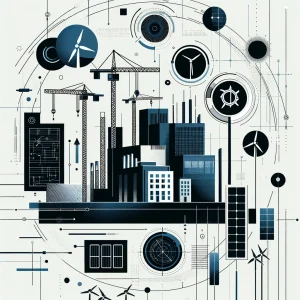The Role of Construction Management in Renewable Energy Projects
In the rapidly evolving sector of renewable energy, the role of construction management is pivotal. Effective management ensures that projects not only meet design and functionality goals but also adhere to budget and timeline constraints. Here’s a detailed look at the essential functions of construction management in the lifecycle of renewable energy projects.
Project Planning and Feasibility Studies
Successful renewable energy projects start with thorough planning and detailed feasibility studies. These initial steps are crucial for outlining the project’s scope, objectives, and deliverables. Feasibility studies assess the technical aspects, environmental impact, and economic viability of projects, laying a solid foundation for informed decision-making. Construction managers play a vital role in coordinating these studies, ensuring that the projects align with strategic energy goals and regulatory requirements.
Managing Multi-disciplinary Teams
Renewable energy projects typically involve a variety of specialists, from architects and engineers to environmental consultants and financial analysts. Construction managers are tasked with leading these multi-disciplinary teams, facilitating communication and collaboration across different expertise areas. Their leadership ensures that all team members are aligned with the project’s objectives, work efficiently, and resolve conflicts that may arise during the project lifecycle.
Overcoming Common Construction Challenges
Construction management involves navigating numerous challenges such as supply chain issues, workforce management, and technological integration. In renewable energy projects, these challenges are compounded by the need for innovation and compliance with stringent environmental standards. Effective construction managers anticipate potential obstacles and implement proactive strategies to mitigate them, ensuring that projects proceed smoothly without compromising safety or quality.
Ensuring Timely and On-Budget Completion
One of the primary responsibilities of construction managers is to deliver projects on time and within budget. This requires rigorous management of resources, careful scheduling, and constant monitoring of project progress against established benchmarks. Construction managers employ advanced project management tools and methodologies to track costs, schedule tasks, and allocate resources efficiently, thereby avoiding delays and cost overruns.
Post-Construction Evaluation and Reporting
After the completion of construction, evaluating the project’s performance against its initial objectives is crucial. This evaluation includes assessing the efficiency of energy production, environmental impact, and economic returns. Construction managers coordinate these post-construction assessments and compile comprehensive reports that provide valuable insights for stakeholders and guide future projects.
Construction management in renewable energy projects is more than just overseeing building activities; it involves strategic planning, leadership, problem-solving, and continuous improvement. As renewable energy technologies evolve and the demand for sustainable energy solutions grows, the role of construction management will become increasingly significant in shaping a sustainable future.
Hashtags: #RenewableEnergy, #ConstructionManagement, #ProjectSuccess, #SustainableBuilding

